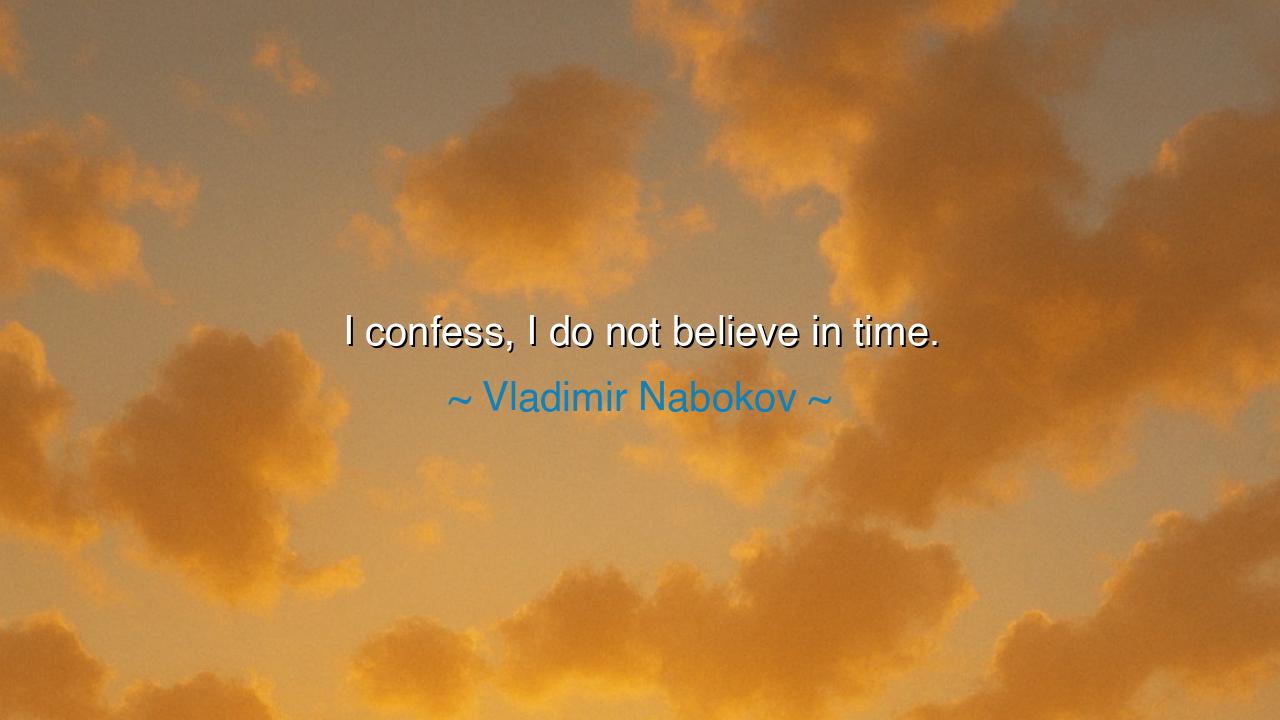
I confess, I do not believe in time.






Hear, O children of wonder, the strange confession of Vladimir Nabokov: “I confess, I do not believe in time.” These words, though spoken in the age of modern letters, resound like the riddles of the ancients. They are not a denial of clocks and calendars, but a deeper truth—that what we call time is but a shadow, a fragile net cast upon the boundless sea of existence. Nabokov, poet of memory and dream, reminds us that the soul does not move in hours and minutes, but in the eternal now, in the undying flame of consciousness.
The origin of this thought lies in Nabokov’s life and work. Exiled from his homeland, he lived between cultures, between languages, between past and present. To him, memory was not a chain of days, but a living presence, where childhood butterflies or moments of love were as real as the present breath. In confessing disbelief in time, he revealed that human experience is not bound by the ticking of the clock. The past and the present dwell together in the soul, and eternity is closer than we think.
This mystery is not his alone. The philosopher Augustine pondered the same, asking: What is time? If no one asks me, I know; if I wish to explain, I do not know. He realized that the past exists only in memory, the future only in anticipation, and only the present truly is. Thus Nabokov’s confession joins the chorus of the wise who have seen through the illusion of time’s tyranny, proclaiming that it is the soul, not the clock, that measures reality.
Consider also the tale of Einstein, who shattered mankind’s understanding of the universe with the theory of relativity. He showed that time itself bends with motion and gravity, that it is not a fixed master but a dimension interwoven with space. When his dear friend Michele Besso died, Einstein wrote that Besso had “departed from this strange world a little ahead of me. That means nothing. People like us... know that the distinction between past, present, and future is only a stubbornly persistent illusion.” Here science and poetry meet: time is less real than truth, less enduring than the spirit.
The lesson of Nabokov’s words is this: do not live as slaves to the clock, fretting away the soul with anxious counting. Live instead in the fullness of the moment, where memory and presence and eternity converge. When you walk in a garden, do not think of how many minutes pass; think of how the fragrance of the rose joins the fragrance of every rose you have ever known. When you embrace a loved one, know that that instant carries all other embraces within it, eternal, untouched by time.
Practical wisdom flows from this. Guard your life not by how long it is, but by how deeply it is lived. A single moment of truth outweighs a year of distraction. Do not measure your worth by calendars or decades, but by the intensity with which you love, create, and seek wisdom. Reflect often on your memories, for they are proof that the past is still alive. Dream boldly, for the future dwells already in the imagination. Live in the present, for it is eternity clothed in flesh.
Thus carry Nabokov’s confession as a torch: “I confess, I do not believe in time.” Let it remind you that while the hours may pass, the soul dwells beyond their reach. Let it free you from the tyranny of clocks, and call you to live not in haste but in depth. For though the sun may rise and set, the eternal flame of being endures, and those who see beyond time will live forever in the fullness of the moment.






AAdministratorAdministrator
Welcome, honored guests. Please leave a comment, we will respond soon